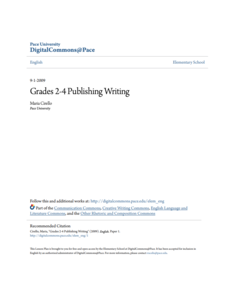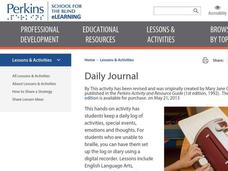Novelinks
The Joy Luck Club: Writing Strategy
Readers of The Joy Luck Club, use a double-0entry journal to record and reflect on passages from Amy Tan's novel.
Berkshire Museum
Nature Journaling: Experience the Outdoors Through Writing and Drawing
Step into the great outdoors and develop young scientists' skills of observation with a nature journaling lesson plan. Given a specific focus or goal, children practice making and recording observations of nature through written...
British Council
Class Journals
Who are you? Scholars draw a shield on the front of their journals that includes four items with which they identify and discuss them with a partner. Readers then use topic suggestions from the board to write about themselves on the...
EngageNY
Speech Writing: Identifying Criteria for a High Quality Conclusion
Learning is never-ending. Scholars learn about effective conclusions as they continue watching a video of an opinion speech. After analyzing the speech's conclusion, they work in small groups to write an ending for their own speeches.
National Council of Teachers of English
Writing Acrostic Poems with Thematically Related Texts in the Content Areas
Scholars scour thematically aligned texts to gather a bank of words they can use in an original acrostic poem.
Pace University
Publishing Writing
Scholars become familiar with tagline literature with the help of the story, Alexander and the Horrible, No Good, Very Bad, Terrible Day by Judith Viort. After a read-aloud and whole-class discussion, leveled groups complete several...
Perkins School for the Blind
Daily Journal
Keeping a daily journal is fun. It builds strong writing skills and provides an expressive outlet. For children with visual impairments, it's even more important. It provides a way for them to connect written word with real events, which...
EngageNY
Planning Ideas: Developing a Colonial Character Profile
The second lesson in a historical fiction series encourages pupils to develop a character profile of a colonial person using research acquired in the previous unit. Learners prepare their historical fiction narrative by responding to a...
Scholastic
D Is for Dreams
Dreams can be mysterious, but they can also be a great start to a creative writing piece. Invite your pupils to use their nighttime or daytime dreams as inspiration for writing. After brainstorming and sharing with small groups, class...
EngageNY
Organizing Evidence from Multiple Informational Texts to Prepare for Writing: What Makes an Earthquake a Natural Disaster?
Fifth graders prepare for their end of the unit essay assessment by continuing to look at what makes an earthquake a natural disaster. They complete a graphic organizer and write a topic sentence. To finish, they view a model essay and...
Teacher Created Resources
Terrific Topic Sentences
Strengthen writing skills with a introductory exercise to learn how to write topic sentences. Using an informational reading passage, pupils delineate the types of sentences they read and discern what the topic sentence should be.
Novelinks
The Little Prince: Response to Art Exercise
Depending on your perspective, solitude can be lovely or very, very lonely. Kids take a look at the simple landscape illustrated in Antoine de Saint Éxupery's The Little Prince, and write a short journal entry about their perception of...
EngageNY
Determining Main Ideas and Details to Write a Summary Paragraph: “Food”
Let's eat! Scholars read pages 24-25 of The Inuit Thought of It to discover the foods eaten by the Inuit. They sketch a visual gist of the section in their journals and write a summary paragraph about the text.
Friends of Fort McHenry
Citizens For and Against the War of 1812
Use this exceptional resource to examine the discourse and debate that occurred at the start of the War of 1812 with your class. Learners will first consider their own position on the war in a silent journal writing activity. Then after...
Spreading Gratitude Rocks
Gratitude Bank
Money isn't the only type of currency that fills a piggy bank. Learners practice filling their banks with the the things that make them grateful. Pupils write about their talents, relationships, challenges, and life skills, making...
Chicago Botanic Garden
Causes and Effects of Climate Change
It's time for your class to literally show what they know! Pupils illustrate what they learned about the causes and effects of climate change by filling out a graphic organizer to complete the 5-part series of lessons. They discuss them...
Encyclopedia Britannica
Candidate Reflection Essay
After writing about which of the 2020 presidential candidates the class has researched most closely represents their ideas, young political scientists take a 2020 Presidential Election Candidate Quiz to determine what candidate they in...
Desert Discoveries
Creating a Garden Journal
Youngsters create science journals which are used to record observations from the school garden. The goal of this activity is to help kids tune into nature by making daily observations on the growth of the plants, and also to take note...
Curated OER
Letters to Poets
Add a strong poetry lesson to your literature unit. Middle and high schoolers investigate their writing voices with journaling and group discussion, then choose a famous poet to study. They write letters to their chosen poets, explaining...
Berkshire Museum
Adopt a Schoolyard Tree
Help young scientists connect with nature and learn about trees with a fun life science lesson. Heading out into the school yard, children choose a tree to adopt, taking measurements, writing descriptions, and drawing sketches of it in...
Penguin Books
An Educator’s Guide to Savvy by Ingrid Law
Literature circles give learners a chance to explore a novel in a unique way. An educator's guide for the book Savvy uses literature circles as part of the novel study. Additional activities cover elements of figurative language and...
My Access
“Banning Books” Lesson Plan
To Kill a Mockingbird, Hunger Games, Brave New World. Welcome to Banned Books Week. As part of a study of censorship and book banning, class members investigate censorship, the purposes of censorship, and First Amendment rights,...
ReadWriteThink
Webcams in the Classroom: Animal Inquiry and Observation
Boost observational skills with an inquiry-based lesson plan that takes scholars on a virtual field trip. With help from webcams, learners observe animals in a zoo or aquarium. Observations go into a journal and a discussion is held to...
University of Arizona
Found News Poems
Combine informational text and creative writing with one fun activity! Middle and high schoolers write found poems based on newspaper headlines that they find. The resource includes a thorough lesson plan and many links to articles that...
Other popular searches
- Christmas Journal Writing
- Daily Writing Journal
- Reflective Journal Writing
- Journal Writing Prompts
- Journal Writing Topics
- Journal Writing for Novels
- Math Journal Writing
- Personal Journal Writing
- Fall Journal Writing
- Ideas for Journal Writing
- Journal Writing Criteria
- Science Journal Writing

























